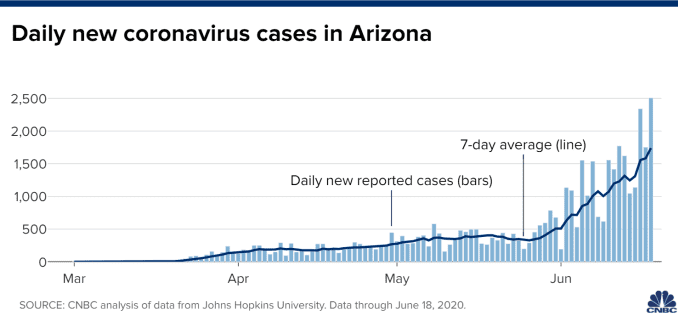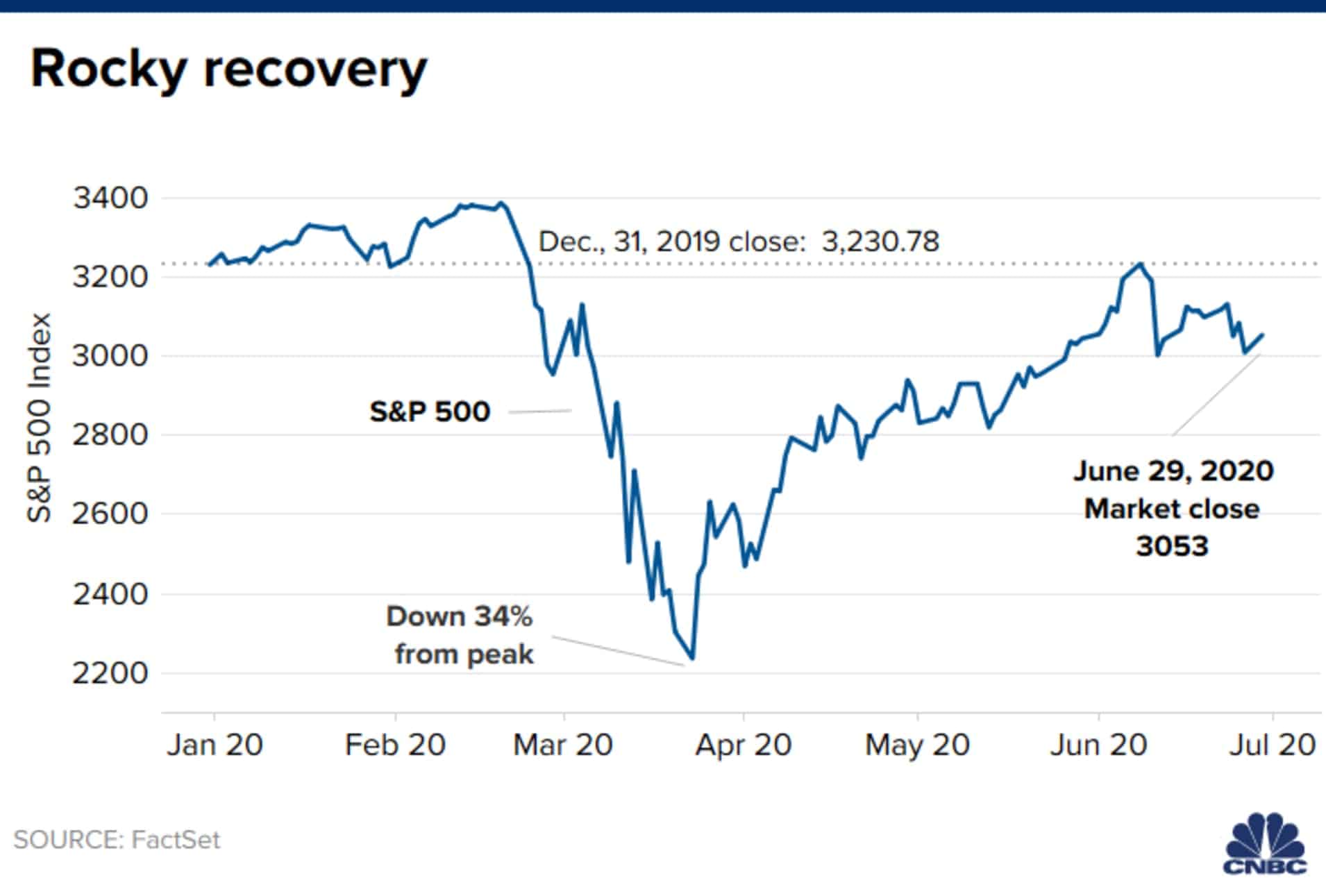The stock market, so eager to put the entire blow from the pandemic behind it, is now coming to terms that a “V-shaped” recovery might be too rosy a scenario.
With recent spikes in coronavirus cases and fluctuations in the economic data, the market seems to be stuck in a range amid elevated volatility. Market analysts said investors should expect more turbulence ahead because the economic recovery is most likely to be bumpy.
“The market was priced for a continuation of improvement and I think that’s overstating what’s going to happen,” said Brian Levitt, Invesco’s global market strategist. “We are going to have episodes of cases rising. We are going to have a very slow and uneven improvement in the jobs market.”
After soaring more than 40% from the March lows, the S&P 500 turned sideways in the past two weeks, trading at similar levels to early June. The market, which used to turn a blind eye to disastrous news on the thinking that the economy had already bottomed, has become more vulnerable to negative economic headlines as the data begins to give a read on the shape of the recovery.
Stocks came under pressure earlier this week after data showed weekly jobless claims rose more than expected last week, and the number stayed above 1 million for the 13th consecutive week.
And on the virus front, California, Texas, Florida and Arizona have reported an uptick in new infections and hospitalizations amid the reopening. Apple said Friday that it’s again closing some stores in Florida, North Carolina and Arizona due to the spikes in coronavirus cases, which sparked a sell-off in the market, especially among retail stocks.

“The economy is going to need more help to bounce back in months to come,” said Matt Miskin, co-chief investment strategist at John Hancock Investment Management. “For now, volatility and choppy markets remain our base case as an uneven economic recovery likely unfolds.”
‘Rolling Ws’
The rally in those popular reopening trades — airlines, cruise lines and hotels — is seemingly losing steam. Shares of American Airlines and Delta posted their second straight weekly losses. So did Carnival, Norwegian Cruise and MGM Resorts. Those stocks were once the high-beta leaders of the market comeback as investors bet that a successful reopening would take hold.
“Although the stock market was suggesting a V-shaped recovery, the more likely scenario is rolling Ws,” Liz Ann Sonders, chief investment strategist at Charles Schwab, said in a note.
A similar market pattern happened during the financial crisis, pointed out by Nicholas Colas, co-founder of DataTrek Research. After stocks rallied nearly 40% from the 2009 bottom, the market was range-bound for about seven weeks so the fundamentals could catch up, Colas noted.
From a technical perspective, Matthew Maley, chief market strategist at Miller Tabak, is watching if the S&P 500 can break above its recent high of 3,232 or drop below the 3,000 threshold or its 200-day moving average of 3,018 as of Friday.
“Whichever way it breaks…should be an very important development in trying to determine how this critical juncture in the stock market will be resolved,” Maley said in a note.
Fed can’t prevent volatility
While the flattening virus curve played a big role in the market rebound, it’s no denying that the Federal Reserve’s unprecedented stimulus has been a key driver in lifting stocks from the coronavirus slump. The central bank unleashed another weapon in its arsenal this week, saying it will start buying individual corporate bonds.
As comforting as it is to have the Fed’s support, the central bank can only do so much to ease investor fears.
“The Fed can’t prevent the volatility we’re seeing in stocks,” Lindsey Bell, chief investment strategist at Ally Invest, said in a note. “It will likely take years for the economy to fully recover and there remain other uncertainties on the path ahead. As such, investors may continue to struggle with this mismatch between markets and the economy before seeing the case for new highs.”
Fed Chairman Jerome Powell reminded investors again this week in his semiannual testimony before Congress that “significant uncertainty remains about the timing and strength of the recovery.”
Many on Wall Street have also warned that extended policy measures including injection of trillions of cheap money would lead to problems down the road such as hyperinflation.

